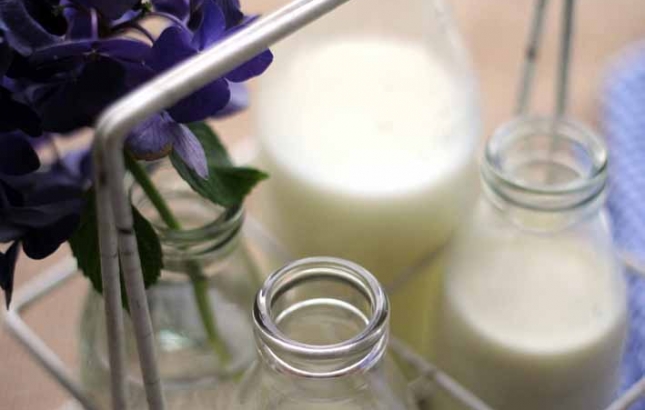
Dairy Dilemma
Moo-ve over cows! Cheesy, I know, but for a huge number of us out there, lactose intolerance and dairy allergies raise all sorts of problems in our daily lives. Thankfully for those of us that still like to enjoy a little cheese every now and then, there’s a wide range of alternatives to dairy milk.. I’ve found a fun but really informative video that explores of some of the most popular milk alternatives out there, but for starters let’s take a look at the difference between allergies and intolerances, as the terms often cause confusion!
Moo-ve over cows! Cheesy, I know, but for a huge number of us out there, lactose intolerance and dairy allergies raise all sorts of problems in our daily lives. Thankfully for those of us that still like to enjoy a little cheese every now and then, there’s a wide range of alternatives to dairy milk.. I’ve found a fun but really informative video that explores of some of the most popular milk alternatives out there, but for starters let’s take a look at the difference between allergies and intolerances, as the terms often cause confusion!
Recent posts by Renée Leonard-Stainton
Allergies are brought on by the consumption of normally harmless substances that the body incorrectly recognises as foreign for some reason (such as lactose). This in turn causes the release of antibodies to fight off their presence in the body. Consequently, the body will release chemical triggers such as histamines to alert the body to the invading ‘enemy’, which can result in inflammation. Allergies can range in severity, and at their most intense can result in anaphylactic shock, which can be life threatening if left untreated.
Food intolerances, on the other hand, don’t involve the immune system directly. Intolerances result when an enzyme needed to digest certain substances doesn’t exist in the body, or only in very small amounts. Those suffering from lactose intolerance don’t have sufficient amounts of the enzyme ‘lactase’, which is responsible for breaking lactose down in the small intestine. Without the necessary amount of lactase, the lactose gets sent straight into the large intestine, causing a range of digestive problems such as gas, bloating, stomach cramps and diarrhea.
Unlike dairy allergies, which many children grow out of, lactose intolerance generally worsens as we age. This is because, as we get older, the amount of lactase our body produces naturally decreases. In fact, in the great majority of the world’s populations, lactase activity declines dramatically in adulthood, to about 5 to 10 % of the activity that was present at birth. This translates to only a relatively small amount (about 30%) of people in the world who produce enough lactase to digest and absorb lactose efficiently throughout adult life!
When more lactose is consumed than the available lactase can handle, molecules remain undigested in the intestine, attracting water and causing bloating, abdominal discomfort, and diarrhea – the classic symptoms of lactose intolerance. The undigested lactose becomes food for intestinal bacteria, which multiply and produce irritating acid and gas, further contributing to the discomfort and diarrhea. Thanks a million, greedy bacteria!
The most reliable testing method for dairy sensitivity is the elimination diet, which involves the avoidance of all casein (the main protein found in dairy), lactose-containing foods and processed foods for two weeks.
After the two-week period you should begin individually re-introducing plain, organic dairy foods. If, after two days, you begin to notice any of the above symptoms, you most likely have a dairy intolerance. If, however, you experience no adverse symptoms after the two days, you may continue slowly re-introducing other dairy products until you either start to get symptoms, or you’re back to a normal diet.
In many cases, lactose intolerant people can actually tolerate fermented milk products such as yoghurt and some cheeses. This is because bacteria in these products digest lactose for their own use, which means that the lactose content of these foods is reduced. Hard cheeses and cottage cheese are often well tolerated as much of the lactose is removed with the whey during processing. So you love your smelly blue cheeses? Good news…lactose continues to decline as the cheese ages to the point of mould…so, basically, the smellier the better if you can tolerate it!
If you’d like to do something about your allergy or intolerance, treatment options range depending on the severity of it. For example, those with a mild intolerance to lactose may still be able to consume limited amounts of dairy products with the use of a digestive aid, such as a lactase enzyme.
Simple avoidance, however, is generally the most reliable form of treatment. At the same time, since dairy is our primary source of calcium intake, if you take on a dairy-free diet, you must be sure to substitute alternative sources of calcium so you don’t become susceptible to deficiencies.
You need to be mindful that dairy (whey, casein and lactose) is used in the manufacturing of many foods. This means making a conscious effort to read labels carefully and identify ingredients. Here’s a good general guide;
Other Names for Dairy Products:
- Butter & Buttermilk
- Casein / Caseinates
- Cheese including cream, curd & cottage
- Cream – all varieties
- Creme fraiche & Fromage Frais
- Ice Cream
- Lactalbumin, Lactic Acid (E270)
- Lactose
- Liquid Milk of all kinds
- Milk solids & Skimmed milk powder
- Whey / Whey protein
- Yogurt
- Where Dairy is Often Found (that you may not expect!):
- Artificial cream
- Batter (for pancakes, waffles, fish fingers etc)
- Biscuits – most include butter or margarine
- Breads – enriched breads often include butter and/or milk – and scones
- Cakes – most use butter & many use milk
- Cheese-flavoured chips
- Creme caramel / Creme Patissiere / Custard
- Chocolate/chocolate products
- Desserts – many different kinds
- Ice creams – most types
- Ready meals – most types
- Rice pudding & most other baked puddings
- Sauces – all white sauces and many other ready made sauces
- Sweeteners
A wide variety of dairy alternatives are being churned out into the mainstream market and with most options having slightly different properties for drinking and cooking, be prepared to sample a variety to figure out which taste and consistency suits you best. Below is a taste of the most popular alternatives and when you’re done, check out the great video link underneath for the low down on pros and cons of the different options.
- Coconut milk
- Oat milk
- Rice milk
- Lactose-free dairy milk
- Hemp milk
- Almond milk
http://abcnews.go.com/Health/video/milk-alternatives-10692003
May you milk the many health rewards that dairy-free alternatives can offer!
Live long, live well, live naturally




Thanks for this great insight into dairy. I find it incredible how dairy has made its way in alsmot everything we eat, without us realizing the potential impact on our health.
If I may add, I think that for some people, their intolerance to lactose may not always come from the lactose itself but from what has been added to the dairy products while being processed or due to the milk coming from badly fed cows. Some nice alternatives then that you have not mentionned are organic goat or sheep cheeses, yogurt or milk which are uselly easier to digest and healthier.
Lastly, it's true that dairy is often present in chocolate, however there isn't usually any milk in chocolate made or minimum 70% cocoa.
Looking forward more posts.
Thanks Natalie. I agree, like sugar, dairy has crept it's way into most packaged foods and you have to turn into a bit of a detective to decipher if foods you're buying contain these ingredients (which can often mean limited choices when you are buying mainstream, even 'healthy' options..) I decided not to include goat's and sheep's milk in this particular article as they contain lactose still. However, I totally agree that they are a fantastic (and yummy - see comment below) addition to the diet if they can be tolerated by people with lactose sensitivities (often this is the case as they are lot lower in lactose than cow's milk). Organic, dark chocolate is a often a good dairy free option (like you say, usually min. of 70% cocoa) and this is thankfully becoming quite a 'trendy' direction for many chocolate manufacturers to go in. In my opinion, the BEST chocolate out there is here http://www.raw-chocolate.net/ I have a major craving now....
Hello Renee! Thanks for your article. This article had perfect timing as I am currently in a dilemma about cows milk. Lately I have been noticing a lot of bloating (due to the fact I am starting to make a lot of smoothies with cows milk). As soon as I drink it I start to feel a little discomfort (maybe after 2-3 hours). I didn't use to have this problem as Ive been having cereal and milk since I was 5. But lately its been a bit worse. What would you suggest are good alternatives? I am currently living abroad (due to return to the western world next year) the only milk they have is soy milk, cows milk, and organic milk. What would you suggest is best? Im thinking organic milk but ive researched it and apparently the jury is still out whether it is good or not. I was drinking soy but that gave me bloating too:( Thanks!
Hi Helen,
It does sound like you may have an intolerance to dairy, and even though you didn't have this as a child, sensitivities to 'once tolerate' foods can develop and change throughout different stages in our life. I think that for you, if you want to still have a milk, it may pay to try organic cow's milk, but see if taking a digestive enzyme helps. This may help your body breakdown the lactose. I know there is a product called 'Dairy Digest' by a company called 'Radiance' that you may be able to purchase over the internet. Is it possible to find coconut or rice milk where you are? If so, these will probably be the most tolerated by you. It may pay also to see what you are having the milk with...could this be contributing to the bloating? Is it a heavily wheat based cereal? Good luck!
thanx Renee :) love alex xxx
Always a pleasure Alex :) x
Thank You Renee! :}
Hi April! Hope you have a lovely Easter (I just started mine by having homemade dark chocolate only-a-littl
I thought i was allergic to dairy but it turns out I'm not and I'm slowly adding organic dairy products back into my diet
thanks heaps xx melody
No, I haven't tried goats yoghurt or feta.. I'll see if I can find it somewhere, I haven't seen it in supermarkets! Thanks for the suggestion! :-)
I've been really confused about the dairy issue to be honest., I was vegan for several years...theres all this info about dairy causing cancer, osteoporosis, amongst all these other problems, and other people say its natures perfect food. There's that a1/a2 thing... I'm not quite sure what to believe but I was getting unhealthy and I decided I didn't want to restrict too much in my diet so I've gone form vegan to pesco vegetarian and feel enormously better already and am losing all my excess weight without too much difficulty.
Your combination doesn't sound that weird, it sound skinda yummy, lo.. i may have to give it a try when I find that feta
Thanks,
Love Melody xxx